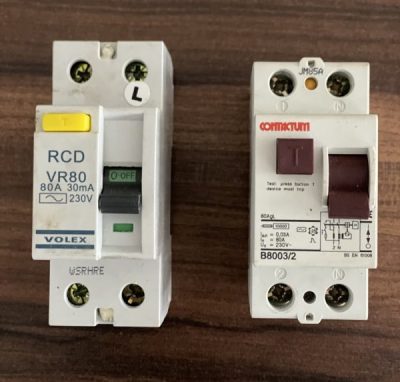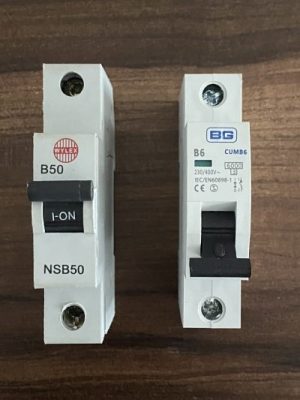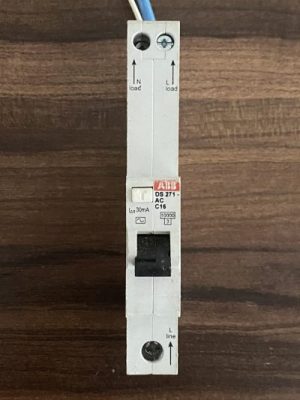FAQs
1What is RCD?

2What is MCB?

3What is RCBO?

4Why do we need an EICR?
Electricity is not visible to the naked eye, and we primarily are not able to perceive the electricity carried by conductors or cables. Cables are usually buried within the walls, and fuse boxes normally inside the cupboards, where they are not instantly visible to the consumers.
The purpose of an EICR is to ensure the safety of the people using electrical appliances and accessories and to guarantee that they are not vulnerable to electrical shocks or fires.
It is therefore common that we often forget to check the conditions of our electrical installations for signs of damage, wear or tear.
Defective and old wiring are one of the biggest causes of electrical fires in the household. It is possible to reduce the risk of a fire by checking the cables, switches and sockets regularly, to examine if they are in a usable and safe condition. This is where ECIRs come into use.
The three main aims of an EICR are:
• Recording inspection & tests’ results with the aim of making sure that the electrical installations are reliable and safe, until the next inspection. Also keeping a record of the installation’s condition for the future inspection reference.
• Discovering any faults, or other damages (wear or tear) that may affect safety and reporting it.
• Finding any piece or component or object of the electrical installations that don’t meet IET Wiring & Safety Regulations or could cause danger.
These tests are conducted by competent electricians. An EICR inspection is highly recommended every 10 years (depending on the wirings overall & installation condition) for a house. For rental properties, inspection & test has to be done every 3-5 years or whenever a tenancy changing.
5Landlords Safety Certificate
The government has established rules on the 1st of June 2020 for landlords, details of the new regulation of compulsory 5 years electrical safety checks in the Private Rented Sector in England starting from July 2020.
From 1st July 2020 all the new tenancies will need an electrical safety check for the related properties.
From the 1st April 2021, all existing tenancies will necessitate an electrical safety check to be done.
An Electrical Installation Condition Report (EICR) is a periodic inspection report for the property’s fixed wiring. This report is called sometimes as the ‘Landlord Certificate’ or ‘Homebuyers Certificate’.
6Existing Regulations to be aware of:
a) HMO
Current “Houses in Multiple Occupation” Regulations 2006 (in England) [Management of HMO] say that properties must have a periodic inspection done every 5 years, by an experienced electrician.
b) Rental
From June 2020, the Electrical safety Standards in the Private Rented Sector (England) Regulations 2020, legally necessitate landlords to ensure that their properties are safe for the tenants and EICRs are done at least once every 5 years and proof has to be provided to the tenant when requested.
7What procedure is taking place when a an EICR (is) taking place in the property? What does a Periodic Inspection include?
When a skilled electrician completes an inspection report, the procedure is executed case by case and site by site. An inspection on a domestic property will differ greatly from a commercial site.
In domestic properties, it begins an initial discussion with the client, covering what extent of the building needs to be tested, (for example how many circuits), and any other restrictions & limitations (such as NOT checking cables in walls or floors, which would need the plaster to be cut out, etc). Communally, electricians have to do initial verification and testing on everything is accessible.
But in commercial estates, there may be some operational restrictions & limitations that need to be discussed with the client by electrician or test engineer beforehand, like switching off servers, powerlines or communication lines any other restrictions that may influence the business. Contractors might agree an initial sampling rate with the client, which would entail the percentage of electrical points they would test initially, and then if any faults arise within that samples, they may decide to increase the sample size (for example, from 20% to 40%) to check for any more faults.
Once a complete range of testing has been done, client will receive an Electrical Installation Condition Report. This is not a certificate, but a factual based report that has outlined the safety and integrity of the electrical installation and anything not meeting regulation or breaching it. Also details of protective devices, list of the defectives wiring or accessories or devices and might include some photos of any concerned subject. Also, the duration that the report is valid and the next due inspection & testing date. In a new domestic property, it would be in 10 years, however, the validation can be given for 3-5 years in old buildings depends on the age of wiring, maintenance condition etc. Attached to the report, a list including details of any recommendations for remedial work or any urgent action.
8What Happens if the EICR is unsatisfactory? And What are C1 , C2, C3 and FI codes in a certificate?
In case of EICR is unsatisfactory then the landlord is obligated and has responsibility to carry out any corrective (remedial) work or more investigation within 28 days of the issue of the report, or a shorter time frame if necessary. The EICR electrical failure codes are categorized and pointed on the report. The significance of each EICR failure code is shown below. An EICR is issued as unsatisfactory if the EICR contains a C1, C2, or FI code.
• C1: Immediate action is necessary and there is clear danger present. This code means that there is high risk of injury and immediate remedial work is needed. Client is recommended to take immediate action with no delay.
• C2: Urgent action is necessary. This failure code is not as severe as a C1 failure, but potentially dangerous and harmful defect is there. Urgent remedial work is recommended.
• C3: Improvement Recommended.
• FI: Further Investigation is necessary.
When EICR is issued as unsatisfactory with a C1, C2 or FI code, then the list of remedial and necessary works and relevant costs would be discussed with the client. For the minor electrical faults or issues, the repair would be done, and the cost would be added to the invoice and then a Satisfactory EICR would be issued while on the site.
9What is the cost of fuse board replacement?
The replacement cost of a fuse box can vary from £400 to £1000 for residential properties and small sized shops. The cost depends on the size of the existing fuse box, the quantity of circuits within the fuse boxes, accessibility to the fuse box, whether the existing wires need to be extended, the condition of the meter tails, the distance between the meter and fuse box, etc. For a more accurate quotation please feel free to call us.
Important Note: Prior to the changing of the fuse boxes, it needs to be noted that; The new metal consumer units would have two RCDs, a safety device that protects the circuits from earth leakage, and people from electrical shock in the case of a fault accruing. After changing the fuse box, in some cases, RCD trips and it means that the house’s circuits or appliances may have earth leakage or a damaged wire or part. Also, It can be a faulty appliance causing trip or a damaged cable inside the wall or faulty switch/socket etc. So, the fault needs to be found. In that case, we will attempt to find out the problem. If we can find the problem in under half an hour, it will be free of charge, but sometimes it can be a very time-consuming job, so the cost of this service would be added to our initially agreed fees.
10What is the cost of EICR?
The average cost of an Electrical Installation Condition Report (EICR) can range between £150-£250. The cost of an EICR does vary depending on your location, the extent of testing, and the age and size of the property.
Listed below are some standard EICR report’s costs for electrical installation inspection & testing as a general guide. For more accurate and detailed quote, an old electrical certificate or a circuit count can be provided to us and we can provide you with a more accurate and detailed quote. If you have a large building and are unsure of the electrical distribution and circuits, we can carry out a free survey.
a) Residential Property EICR Cost
EICR for Studio Flat £99 + VAT
EICR for 1 bedroom Flat £119 + VAT & 2 bedroom Flat £129 + VAT
EICR for 3 bedroom Flat or House £149 + VAT
For house larger than 3 bedroom property, please Contact Us for Price
For multiply properties or HMO please Contact Us for Price
b) Commercial Property EICR Cost
EICR for small office: £99 + VAT
EICR for 1-8 Electrical Circuits: £149 + VAT
EICR for additional circuits above 8 : £149 + VAT + (£10+VAT) per additional electrical Circuit
11What is PAT test?
PAT testing (Portable Appliance Testing) is the means in which the electrical appliances’ safety is checked through a visual inspection and a series of tests
12What types of tests do we take out and offer?
1) Electrical Safety Certificate – Fixed Wire Testing Services
Every electrical installation, fitting & accessories’ productivity & quality gets decreased duo to use and age. It is necessary to do the regular checks for the electrical wiring installation by carrying out a fixed wiring inspection same we do regular services or MOTs for our car. Legally it is the landlord’s responsibility to ensure that tenant(s), or anyone entering their property, are safe and not at risk. A periodic inspection checks an existing electrical installation against BS 7671, the UK standard for the safety of electrical installations.
When buying a property, it is practical to get the electrical wiring & distribution checked and inspected. Electrical issues can be dangerous and very costly to fix/repair and it will become buyer’s responsibility after purchasing the property.
2) Smoke & Fire Detection Alarms
All landlords are obligated by law to have fire-detection equipment in their properties, and all should be at least:
a) A Smoke alarm in the room that is frequently used by tenants for daytime living purposes.
b) A Smoke alarm in every circulation space, such as hallways and landings.
c) A Heat detection Alarm in kitchen and Carbon Monoxide detection within 1-3 meters of a fuel-burning appliance (fires, boiler, etc)
As part of the landlord’s safety check, we do checks and inspection of required detectors if those are up to date and fully functional. We replace and install smoke, heat and carbon monoxide detectors to meet the legal responsibilities (D1/LD2 as the required standard by regulation BS5839-6:2019) that you must uphold to maintain the safety of your tenants.
3) Emergency lighting testing and maintenance services
Emergency lighting in buildings need to be checked and tested and preserved to make sure that they will work in the event of an emergency. A monthly or annual maintenance services & testing is offered for meeting your requirements.
4) PAT testing
PAT testing (Portable Appliance Testing) is the process in which your portable electrical appliances are checked, and their safety verified through a series of visual inspections and tests. We can come to your premises and complete a visual inspection of the portable electrical appliance, their plug and lead and test these. All appliances will be marked as tested, and a full set of test results for each appliance and cable will be provided in a report (certificate).
A complete list of any failed items will be provided with an accurate explanation as to why they have failed.
13Are you insured?
We are registered contractors and are fully insured up to £ 2,000,000 (Public liability and indemnity insurance).
14Can I get advice for the electric appliance and accessories?
Free advice can be given in wide ranges from purchasing the electrical appliances, electrical fitting & accessories, reducing your electricity bill, under floor heating advice for the best type and price, designing home for full or part re-wiring, Smart Home consultations to CCTV installation, also for failed electrical condition report and free quotation for all the jobs you require, small or big. Please feel free to contact us to discuss the matter in further detail.
15What are the offers?
See our full list of the offers here
16Is there any problem with plastic fuse board?
17Is there any problem if my fuse board does not have RCD?
18What is the new regulation 18th edition ?
19What are the common issues for a certificate to be failed?
